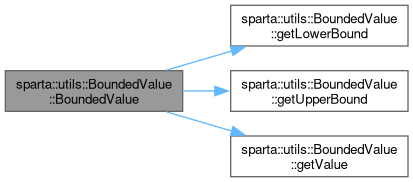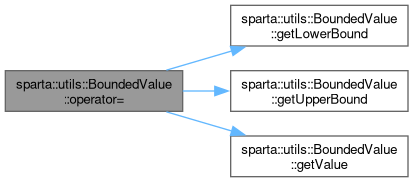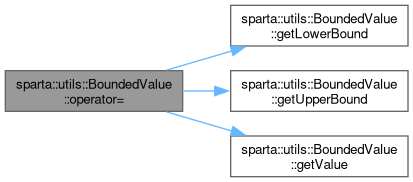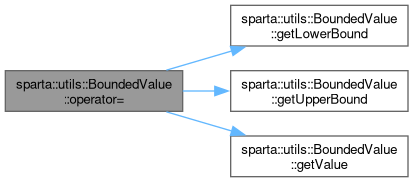This class allows a developer to bound a value within an upper and lower value. More...
#include <BoundedValue.hpp>
Public Types | |
| using | value_type = T |
| template<typename U > | |
| using | pure_value_t = MetaStruct::decay_t<U> |
Public Member Functions | |
| template<typename U , typename V = T, typename W = T> | |
| BoundedValue (U value, V lower_bound=std::numeric_limits< T >::min(), W upper_bound=std::numeric_limits< T >::max(), MetaStruct::enable_if_t< MetaStruct::all_are_integral< T, U, V, W >::value and MetaStruct::all_same_sign< T, U, V, W >::value > *=0) | |
| Parameterized Constructor from related integral arguments. The 4 variables are BV type, initial value, upper bound and lower bound. | |
| template<typename U , typename V = T, typename W = T> | |
| BoundedValue (U value, V lower_bound=std::numeric_limits< T >::min(), W upper_bound=std::numeric_limits< T >::max(), MetaStruct::enable_if_t< MetaStruct::all_are_integral< T, U, V, W >::value and std::is_unsigned< pure_value_t< T > >::value and std::is_signed< pure_value_t< U > >::value and std::is_unsigned< pure_value_t< V > >::value and std::is_unsigned< pure_value_t< W > >::value > *=0) | |
| Parameterized Constructor from related integral arguments. The 4 variables are BV type, initial value, upper bound and lower bound. | |
| template<typename U , typename V = T, typename W = T> | |
| BoundedValue (U value, V lower_bound=std::numeric_limits< T >::min(), W upper_bound=std::numeric_limits< T >::max(), MetaStruct::enable_if_t< MetaStruct::all_are_integral< T, U, V, W >::value and std::is_unsigned< pure_value_t< T > >::value and std::is_unsigned< pure_value_t< U > >::value and(std::is_signed< pure_value_t< V > >::value or std::is_signed< pure_value_t< W > >::value)> *=0) | |
| Parameterized Constructor from related integral arguments. | |
| template<typename U , typename V = T, typename W = T> | |
| BoundedValue (U value, V lower_bound=std::numeric_limits< T >::min(), W upper_bound=std::numeric_limits< T >::max(), MetaStruct::enable_if_t< MetaStruct::all_are_integral< T, U, V, W >::value and std::is_unsigned< pure_value_t< T > >::value and std::is_signed< pure_value_t< U > >::value and(std::is_signed< pure_value_t< V > >::value or std::is_signed< pure_value_t< W > >::value)> *=0) | |
| Parameterized Constructor from related integral arguments. | |
| template<typename U , typename V = T, typename W = T> | |
| BoundedValue (U value, V lower_bound=std::numeric_limits< T >::min(), W upper_bound=std::numeric_limits< T >::max(), MetaStruct::enable_if_t< MetaStruct::all_are_integral< T, U, V, W >::value and std::is_signed< pure_value_t< T > >::value and std::is_unsigned< pure_value_t< U > >::value and std::is_signed< pure_value_t< V > >::value and std::is_signed< pure_value_t< W > >::value > *=0) | |
| Parameterized Constructor from related integral arguments. | |
| template<typename U , typename V = T, typename W = T> | |
| BoundedValue (U value, V lower_bound=std::numeric_limits< T >::min(), W upper_bound=std::numeric_limits< T >::max(), MetaStruct::enable_if_t< MetaStruct::all_are_integral< T, U, V, W >::value and std::is_signed< pure_value_t< T > >::value and std::is_signed< pure_value_t< U > >::value and(std::is_unsigned< pure_value_t< V > >::value or std::is_unsigned< pure_value_t< W > >::value)> *=0) | |
| Parameterized Constructor from related integral arguments. | |
| template<typename U , typename V = T, typename W = T> | |
| BoundedValue (U value, V lower_bound=std::numeric_limits< T >::min(), W upper_bound=std::numeric_limits< T >::max(), MetaStruct::enable_if_t< MetaStruct::all_are_integral< T, U, V, W >::value and std::is_signed< pure_value_t< T > >::value and std::is_unsigned< pure_value_t< U > >::value and(std::is_unsigned< pure_value_t< V > >::value or std::is_unsigned< pure_value_t< W > >::value)> *=0) | |
| Parameterized Constructor from related integral arguments. | |
| template<typename U , typename V = T, typename W = T> | |
| BoundedValue (U value, V lower_bound=std::numeric_limits< T >::min(), W upper_bound=std::numeric_limits< T >::max(), MetaStruct::enable_if_t< std::is_integral< pure_value_t< T > >::value and(std::is_floating_point< pure_value_t< U > >::value or std::is_floating_point< pure_value_t< V > >::value or std::is_floating_point< pure_value_t< W > >::value)> *=0) | |
| Parameterized Constructor from related integral arguments. | |
| template<typename U > | |
| BoundedValue (const BoundedValue< U > &rhs, MetaStruct::enable_if_t< std::is_integral< pure_value_t< U > >::value and std::is_signed< pure_value_t< T > >::value==std::is_signed< pure_value_t< U > >::value > *=0) | |
| Copy Constructor from related integral BV of same sign. | |
| template<typename U > | |
| BoundedValue (const BoundedValue< U > &rhs, MetaStruct::enable_if_t< std::is_integral< pure_value_t< U > >::value and std::is_signed< pure_value_t< T > >::value and std::is_unsigned< pure_value_t< U > >::value > *=0) | |
| Copy Constructor from related unsigned integral BV to signed BV. | |
| template<typename U > | |
| BoundedValue (const BoundedValue< U > &rhs, MetaStruct::enable_if_t< std::is_integral< pure_value_t< U > >::value and std::is_unsigned< pure_value_t< T > >::value and std::is_signed< pure_value_t< U > >::value > *=0) | |
| Copy Constructor from related signed integral BV to unsigned BV. | |
| template<typename U > | |
| BoundedValue (const BoundedValue< U > &rhs, MetaStruct::enable_if_t< std::is_floating_point< pure_value_t< U > >::value and std::is_integral< pure_value_t< T > >::value > *=0) | |
| Copy Constructor from floating-point BV to integral BV. | |
| template<typename U > | |
| MetaStruct::enable_if_t< std::is_integral< pure_value_t< U > >::value and std::is_signed< pure_value_t< T > >::value==std::is_signed< pure_value_t< U > >::value, BoundedValue< pure_value_t< T > > & > | operator= (const BoundedValue< U > &rhs) |
| Copy Assignment Operator from related integral BV of same sign. | |
| template<typename U > | |
| MetaStruct::enable_if_t< std::is_integral< pure_value_t< U > >::value and std::is_signed< pure_value_t< T > >::value and std::is_unsigned< pure_value_t< U > >::value, BoundedValue< pure_value_t< T > > & > | operator= (const BoundedValue< U > &rhs) |
| Copy Constructor from related unsigned integral BV to signed BV. | |
| template<typename U > | |
| MetaStruct::enable_if_t< std::is_integral< pure_value_t< U > >::value and std::is_signed< pure_value_t< U > >::value and std::is_unsigned< pure_value_t< T > >::value, BoundedValue< pure_value_t< T > > & > | operator= (const BoundedValue< U > &rhs) |
| Copy Constructor from related signed integral BV to unsigned BV. | |
| template<typename U > | |
| MetaStruct::enable_if_t< std::is_floating_point< pure_value_t< U > >::value and std::is_integral< pure_value_t< T > >::value, void > | operator= (const BoundedValue< U > &rhs) |
| Copy Assignment Operator for floating-point BV to integral BV. | |
| template<typename U > | |
| MetaStruct::enable_if_t< std::is_integral< pure_value_t< U > >::value, BoundedValue< pure_value_t< T > > & > | operator= (U value) |
| Assignment operator for integral arguments to related BV. | |
| template<typename U > | |
| MetaStruct::enable_if_t< std::is_floating_point< pure_value_t< U > >::value and std::is_integral< pure_value_t< T > >::value, void > | operator= (U value) |
| Assignment operator for floating-point arguments to integral BV. | |
| BoundedValue< T > & | operator++ () |
| Overload pre-increment operator. | |
| BoundedValue< T > | operator++ (int) |
| Overload post-increment operator. | |
| BoundedValue< T > & | operator-- () |
| Overload pre-decrement operator. | |
| BoundedValue< T > | operator-- (int) |
| Overload post-decrement operator. | |
| template<typename U = T> | |
| MetaStruct::enable_if_t< std::is_integral< pure_value_t< U > >::value, BoundedValue< T > & > | operator+= (U value) |
| Overload shorthand += operator. | |
| template<typename U = T> | |
| MetaStruct::enable_if_t< std::is_integral< pure_value_t< U > >::value, BoundedValue< T > & > | operator-= (U value) |
| Overload shorthand -= operator. | |
| const value_type | getValue () const |
| Get the value - const version. | |
| value_type | getValue () |
| Get the value - non-const version. | |
| const value_type | getLowerBound () const |
| Return the lower bound value, const version. | |
| value_type | getLowerBound () |
| Return the lower bound value, non-const version. | |
| const value_type | getUpperBound () const |
| Return the upper bound value, const version. | |
| value_type | getUpperBound () |
| Return the upper bound value, non-const version. | |
| operator const value_type & () const | |
| Convert the BoundedValue into underlying resource, const version. | |
| operator value_type & () | |
| Convert the BoundedValue into underlying resource, non-const version. | |
Detailed Description
class sparta::utils::BoundedValue< T >
This class allows a developer to bound a value within an upper and lower value.
- Template Parameters
-
T The type to wrap - a POD type
Definition at line 32 of file BoundedValue.hpp.
Member Typedef Documentation
◆ pure_value_t
| using sparta::utils::BoundedValue< T >::pure_value_t = MetaStruct::decay_t<U> |
Definition at line 36 of file BoundedValue.hpp.
◆ value_type
| using sparta::utils::BoundedValue< T >::value_type = T |
Definition at line 34 of file BoundedValue.hpp.
Constructor & Destructor Documentation
◆ BoundedValue() [1/12]
|
inlineexplicit |
Parameterized Constructor from related integral arguments. The 4 variables are BV type, initial value, upper bound and lower bound.
- Parameters
-
value The value to assign lower_bound The lower bound of this BoundedValue upper_bound The upper bound of this BoundedValue
Case when all 4 variables are integral and of the same sign(signed). Example:
Case when all 4 variables are integral and of the same sign(unsigned). The 4 variables are BV type, initial value, upper bound and lower bound. Example:
Definition at line 68 of file BoundedValue.hpp.
◆ BoundedValue() [2/12]
|
inlineexplicit |
Parameterized Constructor from related integral arguments. The 4 variables are BV type, initial value, upper bound and lower bound.
- Parameters
-
value The value to assign lower_bound The lower bound of this BoundedValue upper_bound The upper bound of this BoundedValue
Case when BV type, lower and upper bounds are unsigned but initial value is signed. Example:
Definition at line 104 of file BoundedValue.hpp.
◆ BoundedValue() [3/12]
|
inlineexplicit |
Parameterized Constructor from related integral arguments.
- Parameters
-
value The value to assign lower_bound The lower bound of this BoundedValue upper_bound The upper bound of this BoundedValue
Case when BV type, and initial value is unsigned but one of the bounds are signed. Example:
Definition at line 144 of file BoundedValue.hpp.
◆ BoundedValue() [4/12]
|
inlineexplicit |
Parameterized Constructor from related integral arguments.
- Parameters
-
value The value to assign lower_bound The lower bound of this BoundedValue upper_bound The upper bound of this BoundedValue
Case when BV type and one of the bounds is unsigned but initial value and one of the bounds are signed.
Definition at line 185 of file BoundedValue.hpp.
◆ BoundedValue() [5/12]
|
inlineexplicit |
Parameterized Constructor from related integral arguments.
- Parameters
-
value The value to assign lower_bound The lower bound of this BoundedValue upper_bound The upper bound of this BoundedValue Case when BV type, lower and upper bounds are signed but initial value is unsigned. Example: uint32_t data = 15;BoundedValue<int64_t> bv(data, -10, 20);int16_t lower_bound = 20;int32_t upper_bound = 40;BoundedValue<intmax_t> bv(data, lower_bound, upper_bound);
Definition at line 226 of file BoundedValue.hpp.
◆ BoundedValue() [6/12]
|
inlineexplicit |
Parameterized Constructor from related integral arguments.
- Parameters
-
value The value to assign lower_bound The lower bound of this BoundedValue upper_bound The upper bound of this BoundedValue Case when BV type and initial value is signed but one of the bounds is unsigned. Example: int32_t data = 15;BoundedValue<int64_t> bv(data, -10, 20ull);int16_t lower_bound = 20;uint32_t upper_bound = 40;BoundedValue<intmax_t> bv(data, lower_bound, upper_bound);
Definition at line 263 of file BoundedValue.hpp.
◆ BoundedValue() [7/12]
|
inlineexplicit |
Parameterized Constructor from related integral arguments.
- Parameters
-
value The value to assign lower_bound The lower bound of this BoundedValue upper_bound The upper bound of this BoundedValue Case when BV type is signed but initial value and one of the bounds is unsigned. Example: uint32_t data = 15;BoundedValue<int64_t> bv(data, -10, 20ull);int16_t lower_bound = 20;uint32_t upper_bound = 40;BoundedValue<intmax_t> bv(data, lower_bound, upper_bound);
Definition at line 307 of file BoundedValue.hpp.
◆ BoundedValue() [8/12]
|
inlineexplicit |
Parameterized Constructor from related integral arguments.
- Parameters
-
value The value to assign lower_bound The lower bound of this BoundedValue upper_bound The upper bound of this BoundedValue Case which will immediately assert on compilation. If we are creating a BV of type integral, then none of initial_value, lower_bound or upper_bound can be non-integral type.
Definition at line 345 of file BoundedValue.hpp.
◆ BoundedValue() [9/12]
|
inline |
Copy Constructor from related integral BV of same sign.
- Parameters
-
rhs The other BoundedValue object to construct from.
Definition at line 369 of file BoundedValue.hpp.

◆ BoundedValue() [10/12]
|
inline |
Copy Constructor from related unsigned integral BV to signed BV.
- Parameters
-
rhs The other BoundedValue object to construct from.
Definition at line 387 of file BoundedValue.hpp.

◆ BoundedValue() [11/12]
|
inline |
Copy Constructor from related signed integral BV to unsigned BV.
- Parameters
-
rhs The other BoundedValue object to construct from.
Definition at line 404 of file BoundedValue.hpp.

◆ BoundedValue() [12/12]
|
inline |
Copy Constructor from floating-point BV to integral BV.
- Parameters
-
rhs The other BoundedValue object to construct from.
Definition at line 425 of file BoundedValue.hpp.
Member Function Documentation
◆ getLowerBound() [1/2]
|
inline |
Return the lower bound value, non-const version.
- Returns
- The lower bound value.
Definition at line 644 of file BoundedValue.hpp.
◆ getLowerBound() [2/2]
|
inline |
Return the lower bound value, const version.
- Returns
- The lower bound value.
Definition at line 636 of file BoundedValue.hpp.
◆ getUpperBound() [1/2]
|
inline |
Return the upper bound value, non-const version.
- Returns
- The upper bound value.
Definition at line 660 of file BoundedValue.hpp.
◆ getUpperBound() [2/2]
|
inline |
Return the upper bound value, const version.
- Returns
- The upper bound value.
Definition at line 652 of file BoundedValue.hpp.
◆ getValue() [1/2]
|
inline |
Get the value - non-const version.
- Returns
- The internal value.
Definition at line 628 of file BoundedValue.hpp.
◆ getValue() [2/2]
|
inline |
Get the value - const version.
- Returns
- The internal value.
Definition at line 620 of file BoundedValue.hpp.
◆ operator const value_type &()
|
inline |
Convert the BoundedValue into underlying resource, const version.
- Returns
- The internal value.
Definition at line 668 of file BoundedValue.hpp.
◆ operator value_type &()
|
inline |
Convert the BoundedValue into underlying resource, non-const version.
- Returns
- The internal value.
Definition at line 676 of file BoundedValue.hpp.
◆ operator++() [1/2]
|
inline |
Overload pre-increment operator.
Definition at line 539 of file BoundedValue.hpp.
◆ operator++() [2/2]
|
inline |
Overload post-increment operator.
Definition at line 549 of file BoundedValue.hpp.
◆ operator+=()
|
inline |
Overload shorthand += operator.
- Parameters
-
value The value to add.
Definition at line 580 of file BoundedValue.hpp.
◆ operator--() [1/2]
|
inline |
Overload pre-decrement operator.
Definition at line 558 of file BoundedValue.hpp.
◆ operator--() [2/2]
|
inline |
Overload post-decrement operator.
Definition at line 568 of file BoundedValue.hpp.
◆ operator-=()
|
inline |
Overload shorthand -= operator.
- Parameters
-
value The value to subtract.
Definition at line 601 of file BoundedValue.hpp.
◆ operator=() [1/6]
|
inline |
Copy Assignment Operator from related integral BV of same sign.
- Parameters
-
rhs The other BoundedValue object to assign from.
Definition at line 442 of file BoundedValue.hpp.

◆ operator=() [2/6]
|
inline |
Copy Constructor from related unsigned integral BV to signed BV.
- Parameters
-
rhs The other BoundedValue object to assign from.
Definition at line 462 of file BoundedValue.hpp.

◆ operator=() [3/6]
|
inline |
Copy Constructor from related signed integral BV to unsigned BV.
- Parameters
-
rhs The other BoundedValue object to assign from.
Definition at line 481 of file BoundedValue.hpp.

◆ operator=() [4/6]
|
inline |
Copy Assignment Operator for floating-point BV to integral BV.
- Parameters
-
rhs The other BoundedValue object to assign from.
Definition at line 503 of file BoundedValue.hpp.
◆ operator=() [5/6]
|
inline |
Assignment operator for integral arguments to related BV.
- Parameters
-
value The value to assign to this BoundedValue.
Definition at line 516 of file BoundedValue.hpp.
◆ operator=() [6/6]
|
inline |
Assignment operator for floating-point arguments to integral BV.
- Parameters
-
value The value to assign to this BoundedValue.
Definition at line 530 of file BoundedValue.hpp.
The documentation for this class was generated from the following file:
- /github/workspace/sparta/sparta/utils/BoundedValue.hpp